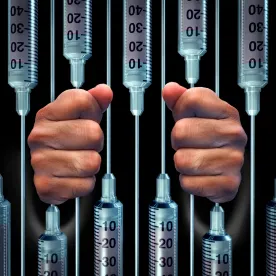Three pharmaceutical companies resolved allegations with the Federal Government for making charitable donations to third-party foundations to cover Medicare patient co-pays for their medicines, which ultimately gave Medicare patients an incentive to select drugs without co-pays over drugs with co-pays. The three drug companies allegedly benefitted from the increase in non-copay medication sales with a correlating increase in Medicare reimbursements from the government.
The Department of Justice recently settled the Medicare Fraud allegations with three pharmaceutical companies allegedly involved in the scheme for a total of $122M. The pharmaceutical companies Jazz, Lundbeck, and Alexion paid $57M, $52.6M, and $13M, respectively to the government to settle the allegations without admitting any guilt.
Paying the patients’ co-pay—even through a third party—incentivizes patients into starting or continuing the use of the pharmaceutical company’s non-copay products, which is a violation of the anti-kickback statue of the False Claims Act. This act “prohibits a pharmaceutical company from offering or paying … to induce Medicare or ChampVA patients to purchase the company’s drugs. This prohibition extends to the payment of patients’ copay obligations.” In this case, the anti-kickback statute exists to prevent healthcare fraud by forbidding the remuneration for referrals for services that are paid for by a federal program, such as Medicare. With this law, a pharmaceutical company whose products are subsidized by Medicare cannot incentivize patients to purchase their products by paying (or having a third party pay) the patient’s co-pay.
Healthcare fraud comes in many different forms and remains one of the most active areas of false claims litigation. The False Claims Act has been an important tool in the fight against government programs fraud since its inception. Investigations by the Federal government are ongoing and often lead to successful indictments. However, the system relies on vigilant citizens who identify the fraud and are willing and able to tell their story and get results with the help of an experienced False Claims Act attorney.
Although the government uncovered the alleged crimes committed by these pharmaceutical companies, there have been many instances where whistleblowers exposed the fraud of companies taking advantage of the Medicare system. In these qui tam lawsuits, the government often compensates whistleblowers for their assistance in their fight against fraud. Special Agent-in-Charge Sean Smith of the VA Office of the Inspector General stated that “Kickback schemes undermine the integrity of our nation’s healthcare system…[and we] will continue to aggressively pursue these investigations and exhaust all efforts to uncover these schemes.”




 />i
/>i

